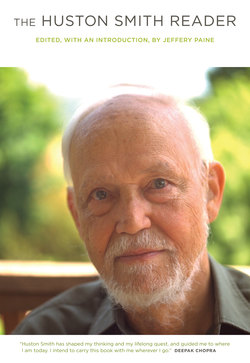Читать книгу The Huston Smith Reader - Huston Smith - Страница 6
На сайте Литреса книга снята с продажи.
ОглавлениеPREVIEW: THE BOOK NOW IN YOUR HANDS
The contents of this volume are easy to describe: they are the best essays and excerpts from Huston Smith's many books, chosen for their relevance and resonance today. In his “Welcome” Huston observes how most Readers have a random, meandering character, but this one is, or hopes to be, more than the sum of its parts.
For here, as one selection succeeds another, something about the elusive nature of religion itself is revealed. An analogy to language may be useful. A second language allows you to begin to see—beyond the idiosyncrasies of your native English or Mandarin—what language itself is and does. Likewise when you encounter sympathetically a second religion: you begin to detect the larger unstated background, the sorrowing and the goodness, the meaninglessness and the ingenuity, the humanness in the universe, out of which all religions arise. This Reader attempts to give such a bird's-eye view of the whole shebang.
In its organization the book follows a schemata Huston used when he investigated “reality” or selfhood, ascending and descending level by level through the several worlds we live in simultaneously. The book begins personally, with Huston confiding his personal experience. From there it widens out into the immediate world, the various kinds of everyday circumstances, surrounding him (and us). The third section ventures further (or deeper), into the sphere of religions itself, which suffuses mundane existence with understanding and, possibly, tools for enhancing it. In the penultimate section, Huston situates even religious experiences in a larger framework—the Big Picture or unconditional worldview—where things finite yield a more infinite aspect. This Reader thus makes, in a sense, a little tour from Berkeley, California, to the ends of the cosmos. Yet it might be truer to say that it goes nowhere at all: each sphere of life, and each section in the Reader, contains a subtle reflection of the others: and so we end with Huston personally again, as he tells about being ninety and encountering God.
Bookkeeping. The one of Huston's books not excerpted here is the one for which he is most famous. The World's Religions reads best as a whole, and with three million copies in print, you can, if you have not already read it, easily acquire a copy. Some of the selections here have been lightly edited, to avoid repeating material already discussed in another essay or dated, now-obscure references. Only a few pieces are particularly challenging (notably “The Levels of Reality” and “The Levels of Selfhood”), but they seem worth it. Writing about religion can at times be complex and difficult, Huston observed and quoted C. S. Lewis, “as difficult as modern physics, and for the same reason.” Huston is overall a pleasing and accessible stylist, though, and most chapters here provide that literary pleasure.
Once, while delivering a public lecture, Huston could find no chalk to make his point on the blackboard. “Never mind,” he said, “I'll write it in air and you will see it vividly.” This volume records what Huston said on those better occasions when he had, as it were, a blackboard and chalk in hand.
